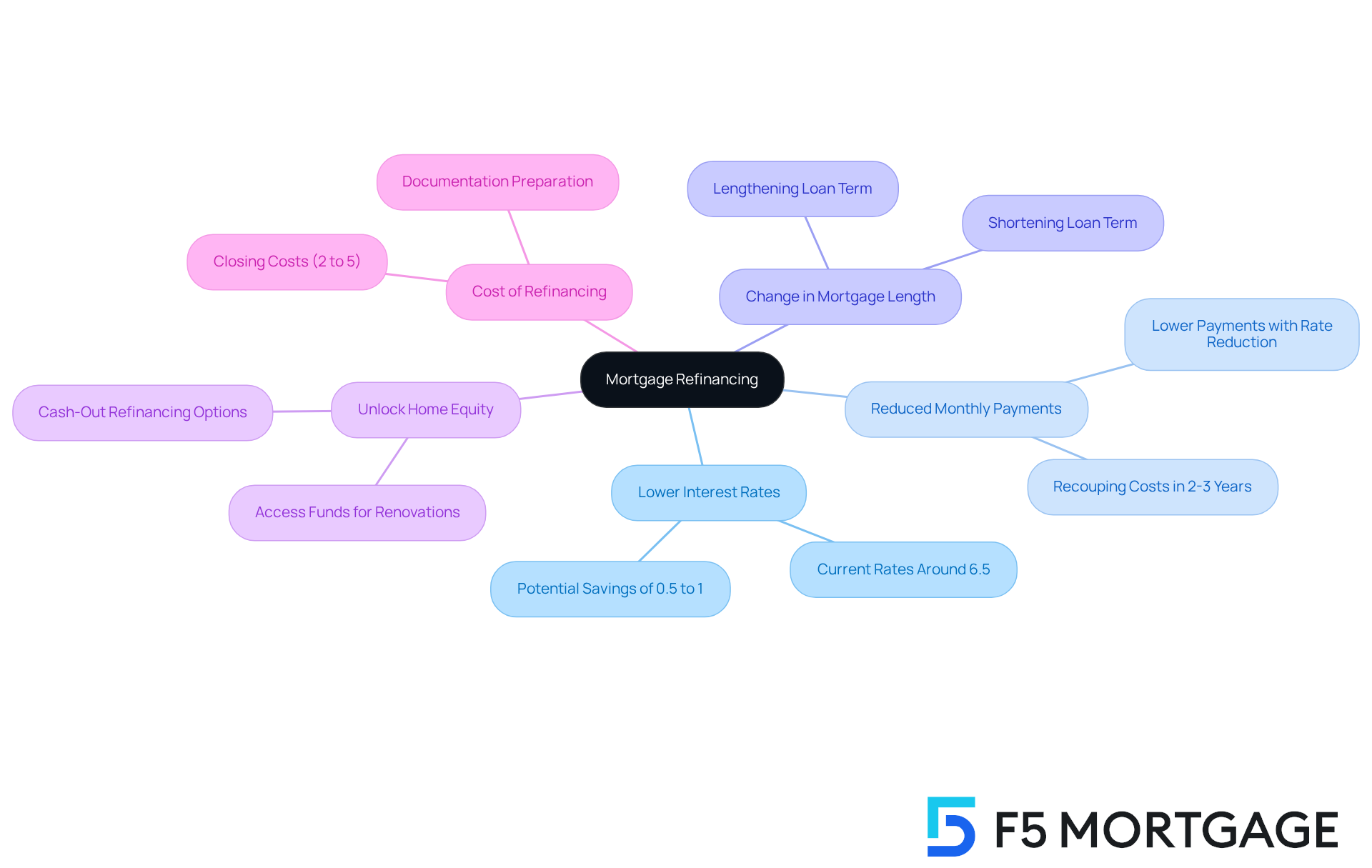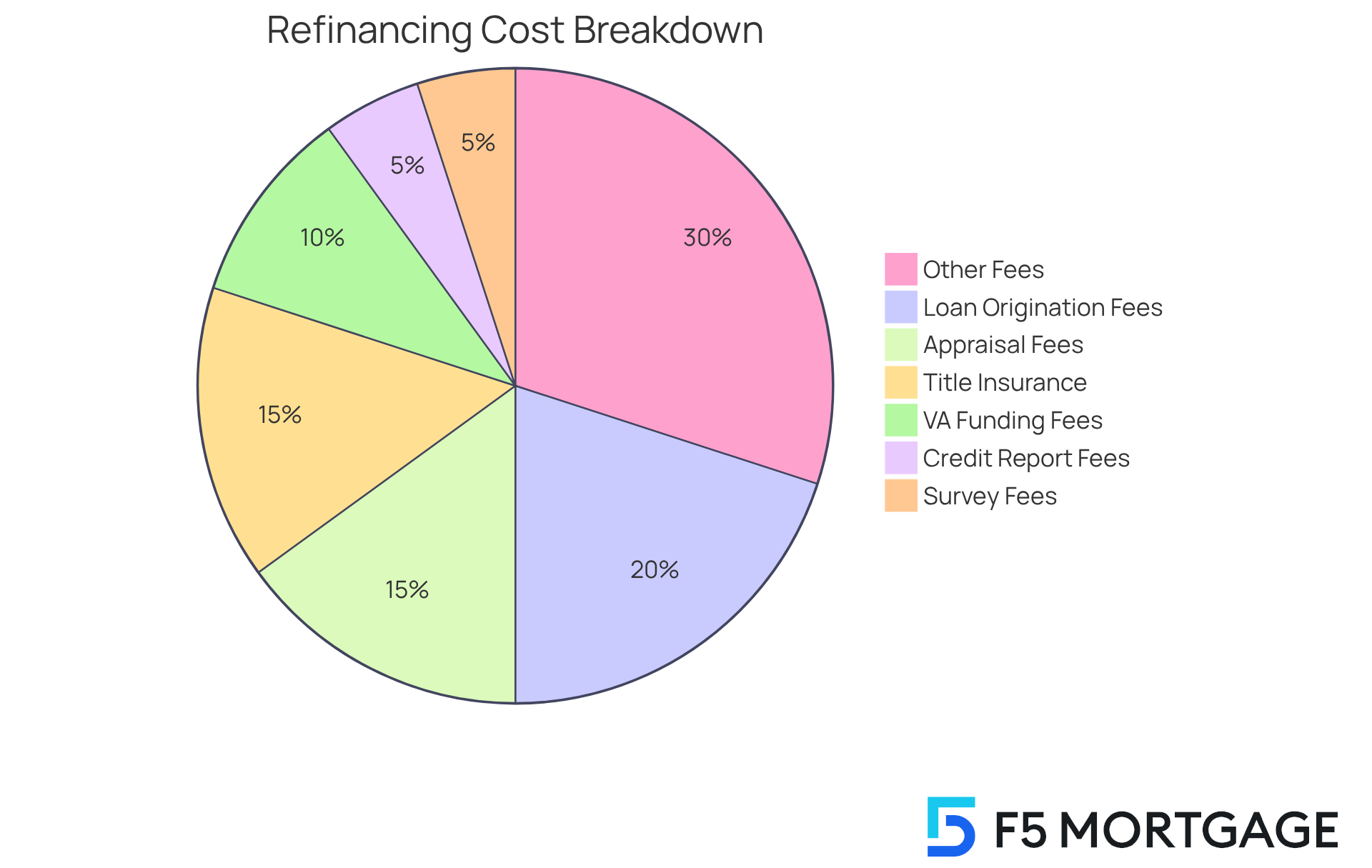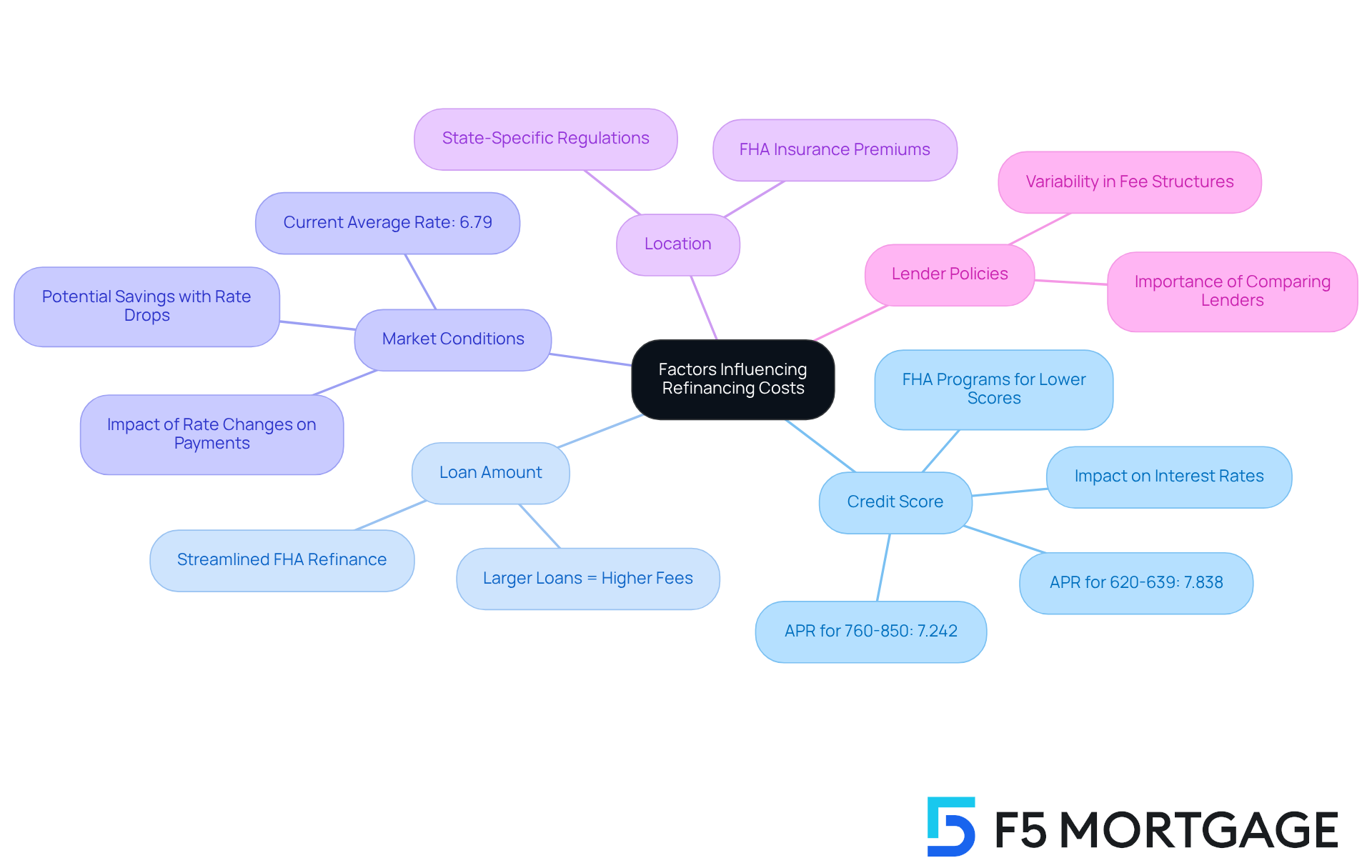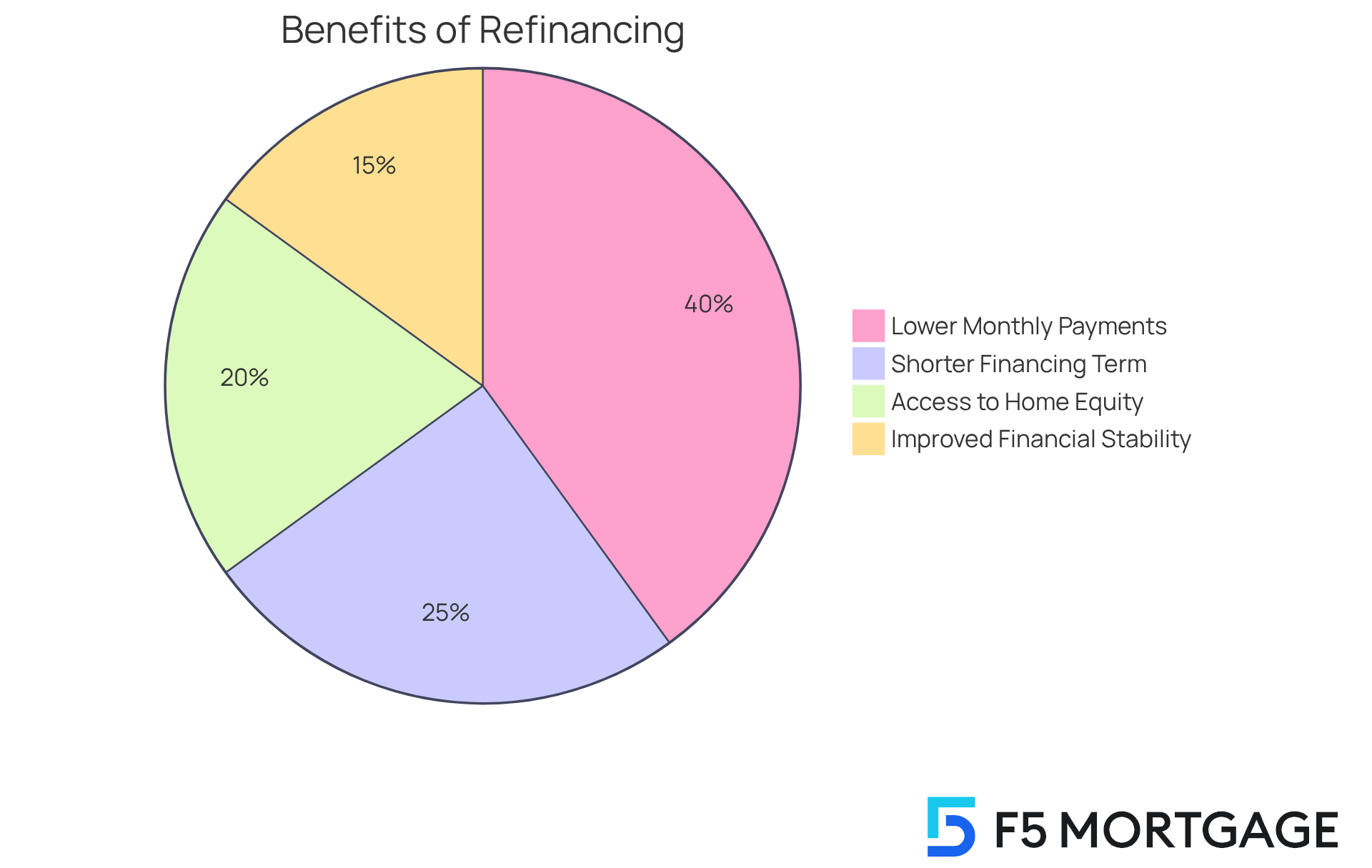Overview
Refinancing a 30-year mortgage can feel overwhelming, especially when considering the costs involved. Typically, these costs range from 2% to 6% of the loan amount. For a $300,000 mortgage, this translates to approximately $6,000 to $18,000. We understand that this can be a significant expense, and various fees and lender practices can influence these figures.
It’s important to delve into what these costs entail. Our detailed breakdown includes:
- Loan origination fees
- Appraisal fees
It also highlights how factors like credit scores and market conditions play a role in the overall expenses. By understanding these elements, you can make more informed decisions about your refinancing options.
We know how challenging this can be, but we’re here to support you every step of the way. Understanding the costs associated with refinancing is a crucial step in navigating this process. Take the time to explore your options and feel empowered to make the best choice for your family’s financial future.
Introduction
Understanding the intricacies of mortgage refinancing can truly empower homeowners to make informed financial decisions. We know how challenging this can be, especially when many property owners are contemplating the costs associated with refinancing a 30-year mortgage. The potential benefits—like lower interest rates and reduced monthly payments—are increasingly appealing. However, the associated costs can vary significantly.
This leads us to a critical question: what factors influence these expenses? More importantly, how can homeowners ensure they maximize their savings in an evolving market? We’re here to support you every step of the way as you navigate this important decision.
Define Mortgage Refinancing and Its Purpose
Mortgage restructuring can feel like a daunting process, but it simply means replacing your current mortgage with a new financial agreement that often offers better conditions. Many homeowners seek refinancing to lower their interest rates, reduce monthly payments, or even change the length of their mortgage, frequently asking how much does it cost to refinance a 30-year mortgage. This thoughtful financial choice becomes particularly appealing when interest rates drop or when your personal circumstances change.
In 2025, a significant number of property owners are opting to refinance, driven by the potential for substantial savings over the life of the loan. For example, if you currently have a mortgage rate above 7%, it may be beneficial to consider a modification, especially if you can achieve a reduction of 0.5% to 1% in your rate. This adjustment can lead to lower monthly payments and overall savings, making restructuring a compelling option.
Additionally, restructuring your mortgage can unlock home equity, providing you with funds for renovations or other financial needs. We understand how important it is to review your loan objectives. We encourage you to explore online loan calculators to assess your potential savings. As the market evolves, understanding how much does it cost to refinance a 30-year mortgage becomes essential for homeowners like you, who are looking to enhance your financial situation. Remember, we’re here to support you every step of the way.

Break Down the Costs of Refinancing a 30-Year Mortgage
Refinancing a 30-year home financing option in Colorado can feel overwhelming, particularly when trying to understand how much does it cost to refinance a 30-year mortgage with the various expenses involved. Generally, these costs range from 2% to 6% of the borrowed amount. For a $300,000 mortgage, this translates to total costs between $6,000 and $18,000, depending on specific fees and lender practices. Understanding how much does it cost to refinance a 30-year mortgage is crucial for homeowners like you who are considering a loan modification, as these costs can significantly impact your financial situation.
Key expenses to be aware of include:
- Loan Origination Fees: These fees, charged by the lender for processing the loan, typically amount to about 0.5% to 2% of the loan balance, averaging around 1%.
- Appraisal Fees: To assess the current value of your home, appraisal fees can range from $600 to $2,000, depending on your property’s location and complexity.
- Title Insurance and Title Search Fees: Protecting against potential ownership disputes, these fees usually range from $1,000 to $2,000.
- Credit Report Fees: This fee, which covers the cost of obtaining your credit report, usually falls between $25 and $75.
- VA Funding Fees: If you’re obtaining a VA loan, funding fees can vary from 1.25% to 3.3% of the loan amount, which is an important consideration for eligible borrowers.
- Survey Fees: If necessary, these can add another $300 to $500 to your total costs.
We know how challenging this can be, but comprehending these expenses is essential for making informed decisions. Furthermore, F5 Mortgage offers support initiatives that could help lower these costs, making the process of obtaining a new loan more accessible for you. As you navigate this journey, consider calculating your break-even point to determine if the savings from a lower-rate loan outweigh the costs of restructuring. We’re here to support you every step of the way.

Examine Factors Influencing Refinancing Costs
Several key factors significantly influence how much it costs to refinance a 30-year mortgage, especially for Colorado homeowners exploring various loan options.
-
Credit Score: We know how challenging it can be to navigate credit scores. A higher credit score generally leads to lower interest rates and fees. For instance, borrowers with a credit score of 760-850 can expect an average APR of around 7.242%, while those with scores between 620-639 face rates as high as 7.838%. This disparity illustrates how crucial credit scores are in determining how much does it cost to refinance a 30-year mortgage. Additionally, Colorado residents may find competitive choices through specific financing types, such as FHA programs, which are available to those with lower credit scores, typically starting at 580. FHA mortgages also have lower DTI criteria compared to traditional financing, making them a feasible choice for many property owners.
-
Loan Amount: When considering refinancing, the total amount being refinanced can impact the percentage of fees charged. Bigger mortgages frequently lead to greater total expenses. It’s crucial for homeowners to evaluate how much does it cost to refinance a 30-year mortgage when they are reapplying. For instance, converting an FHA mortgage into a streamlined option can assist in decreasing monthly payments while possibly lowering fees. The streamlined refinance process allows existing FHA borrowers to refinance without the need for a full credit check or appraisal, making it a faster and more convenient option.
-
Market Conditions: Understanding market conditions is essential for making informed decisions about loan restructuring, including knowing how much it costs to refinance a 30-year mortgage. As of Q2 2025, the average rate on 30-year mortgages was approximately 6.79%, a decrease from the peak of 7.79% in 2023. Lower rates can significantly decrease monthly payments, which raises the question of how much does it cost to refinance a 30-year mortgage as a cost-effective option. For instance, a decrease from 7.25% to 6.5% could save a borrower $200 each month on a $400,000 mortgage. If rates fall to 5.5%, more than 7 million borrowers could potentially refinance, creating significant savings opportunities.
-
Location: It’s important to recognize that various states, including Colorado, have differing regulations and fees linked to loan modification, which can influence overall expenses. Homeowners should understand local regulations and charges that may apply to their refinancing process, especially when evaluating how much does it cost to refinance a 30-year mortgage with VA financing or FHA alternatives. For FHA loans, property owners should also be aware of the two insurance premiums: an upfront premium of 1.75% of the loan amount and an annual premium ranging from 0.45% to 0.85%.
-
Lender Policies: Each lender has its own fee structure, leading to significant differences in costs between institutions. We’re here to support you every step of the way in navigating these options. F5 Mortgage can help property owners find the best deal tailored to their financial situation.
By understanding these elements, residents of Colorado can navigate the refinancing process more efficiently and learn how much does it cost to refinance a 30-year mortgage, potentially reducing their loan expenses.

Evaluate Potential Savings and Benefits of Refinancing
Refinancing a loan can offer numerous savings and advantages, especially for residents of Colorado who are asking how much does it cost to refinance a 30-year mortgage through F5 Mortgage. We understand how overwhelming this process can feel, and we’re here to help you navigate it with care. Here are some benefits you might find appealing:
-
Lower Monthly Payments: By securing a lower interest rate, homeowners can significantly reduce their monthly mortgage payments. This can free up cash for other essential expenses. For example, when considering how much does it cost to refinance a 30-year mortgage, restructuring a $300,000 home payment from a 7% interest rate to a 5% rate could save you over $400 each month, leading to substantial savings over the life of your loan.
-
Shorter Financing Term: Opting for a shorter duration can help you save on interest payments throughout the financing period. This approach allows homeowners to pay off their mortgage faster, which can enhance your financial stability and peace of mind.
-
Access to Home Equity: Cash-out refinancing enables homeowners to tap into their home equity, providing funds for home improvements, debt consolidation, or other financial needs. This option is available through various financing types, including conventional and FHA loans, giving you flexibility in your financial decisions.
-
Improved Financial Stability: Knowing how much does it cost to refinance a 30-year mortgage can help stabilize your monthly payments, especially if you’re transitioning from an adjustable-rate mortgage (ARM) to a fixed-rate mortgage. This is a key advantage of options like the Colorado Streamline Refinance Loan, which offers a fast and convenient process for existing FHA borrowers.
In summary, refinancing with F5 Mortgage not only provides competitive rates but also customizable loan options tailored to the unique needs of Colorado homeowners. We’re here to support you every step of the way, making it an attractive choice for those looking to enhance their financial situation.

Conclusion
Refinancing a 30-year mortgage can be a strategic financial decision that enables homeowners to improve their loan terms, reduce monthly payments, and access home equity. We understand how challenging this process can be, and recognizing the costs associated with refinancing is crucial. These expenses can vary significantly based on factors like credit scores, loan amounts, and market conditions. With the potential for substantial savings, especially in a fluctuating interest rate environment, evaluating the cost of refinancing becomes an essential consideration for homeowners looking to enhance their financial standing.
Key insights from the article highlight the various costs involved in refinancing, which typically range from 2% to 6% of the loan amount—translating to thousands of dollars for a typical mortgage. Homeowners should be aware of specific fees, such as:
- Loan origination
- Appraisal
- Title insurance
Additionally, understanding how their credit score and current market conditions can influence these costs is vital. The potential savings from lower interest rates and the ability to access home equity through cash-out refinancing present compelling reasons to explore this option.
Ultimately, the decision to refinance a mortgage should be informed and strategic. It’s important to consider both the immediate costs and long-term benefits. We encourage homeowners to utilize online calculators and consult with mortgage professionals to assess their unique situations. By doing so, they can ensure that refinancing aligns with their financial goals, leading to lasting savings and stability. We’re here to support you every step of the way.
Frequently Asked Questions
What is mortgage refinancing?
Mortgage refinancing is the process of replacing your current mortgage with a new financial agreement, often with better conditions, such as lower interest rates or reduced monthly payments.
Why do homeowners seek to refinance their mortgages?
Homeowners typically seek refinancing to lower their interest rates, reduce monthly payments, or change the length of their mortgage. It becomes particularly appealing when interest rates drop or personal circumstances change.
When is refinancing particularly beneficial for homeowners?
Refinancing is particularly beneficial when mortgage rates are above 7% and can be reduced by 0.5% to 1%, leading to lower monthly payments and overall savings.
What can refinancing unlock for homeowners?
Refinancing can unlock home equity, providing homeowners with funds for renovations or other financial needs.
How can homeowners assess their potential savings from refinancing?
Homeowners can explore online loan calculators to assess their potential savings from refinancing.
What should homeowners consider before refinancing?
Homeowners should review their loan objectives and understand the costs associated with refinancing a 30-year mortgage to enhance their financial situation.








